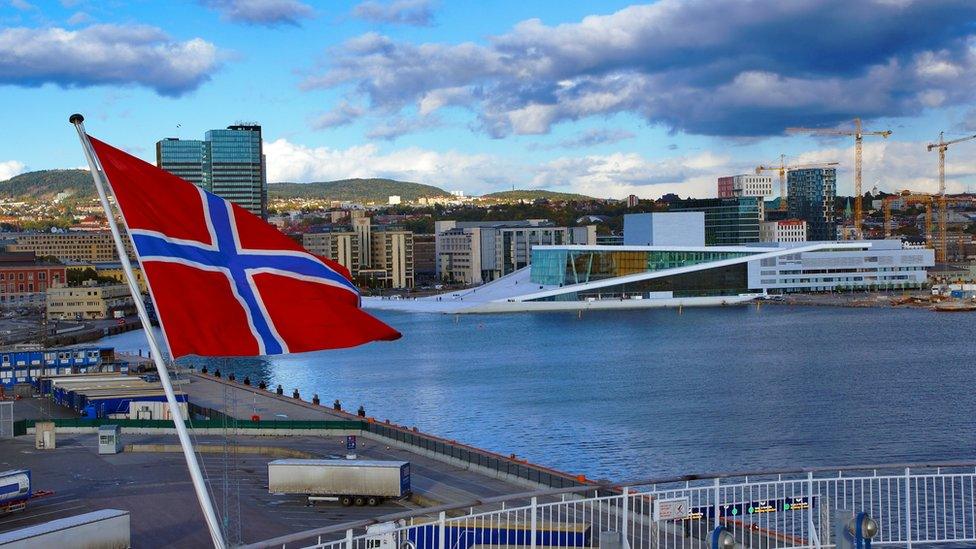Former Scottish first minister Alex Salmond holds talks over 'Norway model'
- Published

BBC Scotland understands Mr Salmond recently travelled to EFTA's headquarters in Geneva
Alex Salmond has held informal talks at the European Free Trade Association (EFTA) about the UK's future relationship with Europe.
It is understood the former Scottish first minister recently travelled to the trade club's headquarters in Switzerland.
His successor, Nicola Sturgeon, is exploring ways of keeping Scotland inside the European single market.
EFTA members currently include Norway, Iceland and Lichtenstein.
Although not members of the European Union, they are signed up to the free movement of goods, services, capital and people alongside the 28 EU countries what is called the European Economic Area (EEA).
The Scottish government would like the UK as a whole to seek a similar arrangement as it prepares to leave the European Union.
If that does not happen, Ms Sturgeon has confirmed that she would look at the Norwegian model as a possible route for Scotland to stay in the European single market, without leaving the UK.
Speaking at a meeting of EFTA ministers in Geneva, Norway's trade minister Monica Mæland made clear that Scottish membership was not currently possible under existing rules.
She said: "As for now, I think Scotland have not the competence to go into this EFTA but I think this is an internal matter for the UK, so I think Scotland should talk to the government in the UK about these matters."

Representatives of the four EFTA members are currently meeting in the Swiss capital
But Iceland's foreign minister, Lilja Alfreðsdóttir, who currently chairs EFTA, did not rule out the possibility of special arrangements for Scotland.
Ms Alfreðsdóttir, who recently met Nicola Sturgeon in Reykjavik, said it was "too premature to exclude anything".
She said SNP politicians had been "very interested both in EFTA and also the EEA arrangement that Norway, Iceland and Lichtenstein have".
She added: "It is interesting but of course you need to be a sovereign state to apply but maybe as a possibility going forward - you never know."
Liechtenstein's foreign minister, Aurelia Frick, said Scottish representatives were "coming and visiting Lichtenstein, and trying to find out especially about the functioning of the European Economic Area that allows Liechtenstein, Iceland and Norway to be part of the EU single market".
Market access
She said Liechtenstein can inform Scotland about the way the EEA and EFTA work, but said the UK must sort out its post-Brexit ambitions before membership in either could be considered.
The Scottish government is expected to publish an options paper in December.
UK ministers have said the will consider proposals from the devolved administrations but have emphasised the need for an agreed UK-wide negotiating position.
It would be open for the UK to seek to stay part of the single market as part of the EEA, through membership of EFTA.

(l-r) Ms Mæland, Ms Frick and Ms Alfreðsdóttir are all attending the EFTA meeting
Ms Alfreðsdóttir said Iceland would welcome an application from the UK, adding that "I believe the EFTA would be stronger with the UK inside".
But that option may be unacceptable to many Leave voters in the UK because Norway, Iceland and Lichtenstein pay contributions to the EU in exchange for market access and have to allow EU citizens the right to live and work in their countries.
EFTA countries must comply with the rules of the single market without getting a formal say in shaping them.
Some have suggested EFTA/EEA membership for the UK as a transitional arrangement for several years while longer term trading relationships are negotiated.
Ms Mæland said she had discussed the potential need for transitional arrangements with UK international trade minister, Lord Price, last week.
She said: "That was something Price was talking about - what are we going to do in the meantime? So we are hoping to discuss several solutions."
Departure terms
The UK government has not publicly confirmed that it will require any interim trading arrangements once the two year Brexit negotiations end.
It has suggested that departure terms and the UK's future relationship can be negotiated together.
While the UK as a whole voted to leave the EU in the referendum on 24 June, Scottish voters backed Remain by 62% to 38%.
The Scottish government has interpreted that as a mandate to keep Scotland as close as possible to the EU.
Ms Sturgeon has specifically said her priority is to keep Scotland in the single market.
Her preference is for the whole UK to stay in. If that is not possible she wants a special arrangement to keep Scotland in.
'Strong society'
If neither of those options work out, she is preparing for a possible second referendum on Scottish independence.
Mr Salmond's talks with EFTA officials seem to be part of a wider discussion between SNP politicians and the association's member governments.
Ms Sturgeon recently met Icelandic ministers at an Arctic Council in Reykjavik.
EFTA's fourth member country is Switzerland. It is not part of the EEA but trades goods freely with the EU under a series of bilateral agreements. It has also signed up to the free movement of people.
The president of the Swiss Confederation, Johann Schneider-Ammann, said he was confident the UK would prosper outside the EU, whichever model it pursues.
"The UK will be successful anyway," he said.
"The UK is such a strong economy, such a strong society, I do not fear that they wouldn't be able to defend its strengths and become a real player".
If the UK does not agree a new trading relationship with the EU by the point of Brexit in 2019, the fallback position is to use the World Trade Organisation's system of tariffs for imports and exports.
If the UK supported a Scottish government bid for EFTA/EEA membership it would probably require extra devolution of power to allow Scottish ministers to make International agreements.
- Published16 November 2016

- Published15 November 2016
- Published15 June 2016
